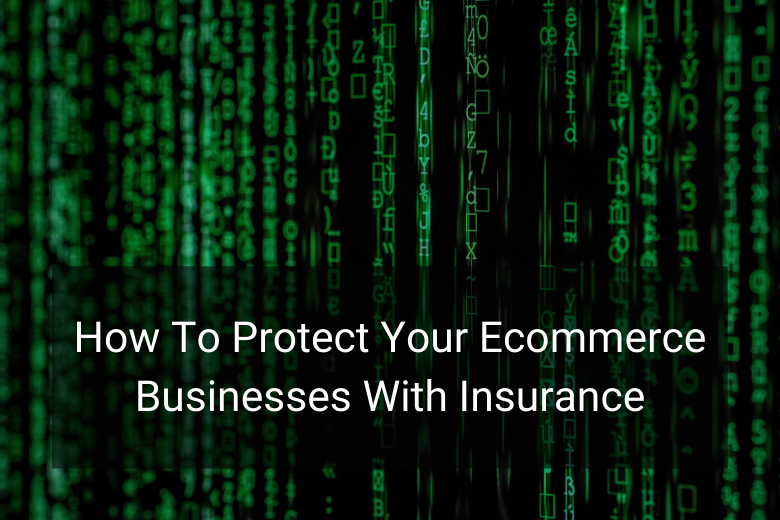The ecommerce industry is growing at an incredibly fast rate, and ecommerce sales are pegged to increase to over 4 trillion dollars in 2020. And it’s easy to see why. Ecommerce allows sellers to reach a massive audience without geographical restrictions, offering great convenience and better margins than brick-and-mortar retailers. This success of ecommerce has changed the way we look at shopping. Now more than ever, it’s easier for sellers to connect with buyers.
However, this success has also meant a wide variety of risks. Given that ecommerce is a very unique industry its risk profile is equally unique and complicated. In this article, we’ll cover what unique risks ecommerce businesses face and how to protect your ecommerce business against them.
The Unique Risks of Ecommerce
The ecommerce business model faces a bevy of unique risks that are mostly tied to their online presence, but also more conventional risks connected to their products. Let’s cover what risks you can expect to face as an ecommerce company:
Cyber Risks
Ecommerce is hugely affected by cybercrime. More than 30% of all attacks targeting the industry specifically. And these numbers make sense. After all, ecommerce businesses store huge amounts of their customer’s personal information, including their credit card information. No matter the size, ecommerce businesses should carefully consider their options for both stopping and managing cyber attacks.
Product Liability Risks
Product liability issues may arise if the products you are selling malfunctions and results in bodily injury or damages to the consumer. Commonly this stems from either badly made or designed products. The additional risk may come from inadequate warnings or instructions for the product. And these issues can affect you even if you’re selling products manufactured by other companies, so it pays to be careful.
Professional Liability Risks
Since most ecommerce transactions occur online, there are contracts and promises that are made before the transaction occurs, even if no one actually reads them. This means that if you make a mistake or deliver products or services that were not up to specifications in terms of what you promised, consumers may end up suing your business if they end up losing money.
Privacy Risks
Something that happens almost automatically is that ecommerce businesses end up with a lot of their visitors and customers’ personal information. In order to avoid regulatory issues, here’s how to protect your ecommerce businesses with insurance. This needs to be done in a clear, transparent manner and compliant with GDPR regulations in Europe, and US Federal and State laws that protect the privacy rights of all online citizens.
Recommended Ecommerce Insurance Coverages
The fact that ecommerce businesses use the Internet to connect sellers and buyers means that they have a unique, tech-heavy risk profile. However, even though they face unique risks, it’s also important to address the common risks that they share with other businesses. Let’s break down how you can protect your ecommerce businesw With Insurance and what policies every ecommerce business should have in place in order:
General Liability Insurance
This is a basic insurance policy that will protect your business from claims of injury and property damage to third-parties. If you plan on leasing office space you’ll need this coverage. However, even if you’re operating out of your house, you’ll still want to get general liability as your Homeowners policy won’t protect your business activities.
Workers’ Compensation Insurance
Most states will require you to carry workers compensation insurance. The policy will cover medical expenses and lost wages if a workplace injury occurs. Most ecommerce activities will be seen as low risk by insurers, and you won’t have to pay much to be properly covered. An exception to this would if you owned and operated warehouses
Product Liability Insurance
Product liability is crucial coverage for ecommerce businesses. How does product liability insurance protect your ecommerce business? Well, any product that you send out can lead to a potential lawsuit if your users are injured or suffer losses because of it. Manufacturing and design mistakes or bad instructions can mean you are held liable, regardless of your place in the distribution chain.
Cyber Insurance
The necessary online component of ecommerce businesses means that they are open to cyber risks. Process transactions and collecting massive amounts of customer information means that potential attacks and data breaches can be a costly proposition.
A good cyber policy would respond to cover potential lawsuits, penalties, settlements, investigation and notifications costs of a cyberattack.
Technology Errors & Omissions Insurance
This coverage will protect you from claims arising from the failure of your product to perform its contracted purpose or errors connected to the services that you promised in conjunction with the product. Since most ecommerce transactions are carried out online, they may have
Directors & Officers
This coverage becomes more important as your business grows, and starts looking for funding or enlarging the executive team. It would respond to cover defense costs and settlements from lawsuits brought against your company’s directors and executives for allegations of breach of fiduciary duty, misrepresentation, or errors & omissions. If such claims were to happen their personal assets could be endangered, and this means that most investors will require you to carry this policy – as they’ll want a seat on your board.
Employment Practices Liability Insurance
If you have employees this insurance will protect you from claims related to harassment, discrimination, wrongful termination, and similar issues. Many smaller businesses view EPLI coverage as a luxury, but employment claims are on the rise and increasing in severity. Due to this increase, it would be wise for even the smallest ecommerce businesses to look into securing a good policy.
Commercial Crime Insurance
This insurance will protect you from losses caused by criminal events carried out by either your employees or third parties. For ecommerce businesses, the most common risks are embezzlement or theft of inventory.
Cargo Insurance
This coverage will protect your business with insurance from loss or damage to your products while they are stored or during transport. If you are storing your products in a warehouse either owned or rented or ship products to your customers, then you should strongly consider cargo insurance.
Foreign Commercial Insurance
This policy would extend your coverage to foreign operations. Standard coverage such as general liability, product, and property are typically included.
Need a shipping solution?
Floship is an e-commerce order fulfillment provider based in Hong Kong. We help emerging e-commerce brands store, pick, pack and deliver their orders worldwide from our warehouses in either Hong Kong, Shenzhen or Europe. Reach out by filling out our Get Global Solutions form and one of our solution experts will get back to you with a solid shipping solution.

Ready To Upgrade Your Logistic Solution?
Speak to Floship ecommerce logistic consultant about improving your global support chain today





